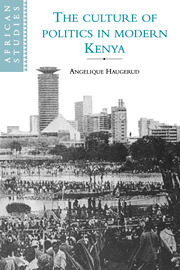Book contents
- Frontmatter
- Contents
- List of maps
- List of tables
- Preface
- 1 Introduction: staging politics in Kenya
- 2 Shattered silences: political culture and “democracy” in the early 1990s
- 3 Open secrets: everyday forms of domination before 1990
- 4 Moral economy and the quest for wealth in central Kenya since the late nineteenth century
- 5 The dove and the castor nut: Embu household economy in the 1980s
- 6 Conclusions: the showpiece of an hour
- Notes
- Bibliography
- Index
- Titles in the series
4 - Moral economy and the quest for wealth in central Kenya since the late nineteenth century
Published online by Cambridge University Press: 05 June 2012
- Frontmatter
- Contents
- List of maps
- List of tables
- Preface
- 1 Introduction: staging politics in Kenya
- 2 Shattered silences: political culture and “democracy” in the early 1990s
- 3 Open secrets: everyday forms of domination before 1990
- 4 Moral economy and the quest for wealth in central Kenya since the late nineteenth century
- 5 The dove and the castor nut: Embu household economy in the 1980s
- 6 Conclusions: the showpiece of an hour
- Notes
- Bibliography
- Index
- Titles in the series
Summary
Introduction
This chapter begins with a look back to a time before Kenyans could be instructed en masse that theirs was a nation “on the run” toward “development,” and that each individual had to move quickly to keep up with the president's rapid footsteps or nyayo. Whereas the previous chapter explored notions of “Kenya” conveyed to citizens through official rhetoric, this one starts with a look at life in the central highlands before radio, newspapers, cinema, and television brought Kenyans into a national and global “village.” This is not an exercise in nostalgia. Rather, its purpose is to appreciate historical precedents for a public culture that valorizes collective effort as well as individual entrepreneurship and accumulation, and that projects its own Western modernity, economic growth, and political stability as counterexamples to the recent history of other African nations. It is not surprising that a state controlled by wealthy entrepreneurs would advertise the material rewards of hard work. Nor is it unusual that such a state would make a repeated show of intentions to eliminate “corruption” among public servants, without actually altering the opportunities for accumulation open to such individuals.
Who is or who deserves to be rich and who poor has probably never been a cultural zone of easy consensus. The material rewards of political leadership – whether in pre-colonial raiding expeditions or in election to parliament – are matters of discussion and argument in which everyone takes a keen interest.
- Type
- Chapter
- Information
- The Culture of Politics in Modern Kenya , pp. 108 - 138Publisher: Cambridge University PressPrint publication year: 1995

